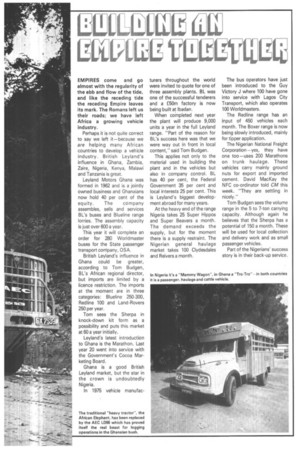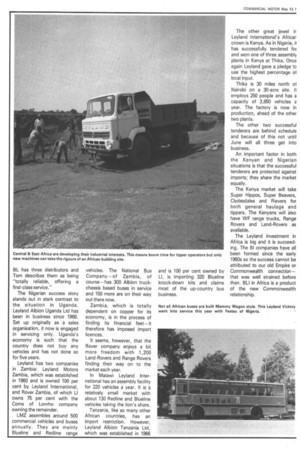aLLELLL
Page 81

Page 82

If you've noticed an error in this article please click here to report it so we can fix it.
LkLA fie LLVILL
EMPIRES come and go almost with the regularity of the ebb and flow of the tide, and like the receding tide the receding Empire leaves its mark. The Romans left us their roads; we have left Africa a growing vehicle industry.
Perhaps it is not quite correct to say we left it—because we are helping many African countries to develop a vehicle industry. British Leyland's influence in Ghana, Zambia, Zaire, Nigeria, Kenya, Malawi and Tanzania is great.
Leyland Motors Ghana was formed in 1962 and is a jointly owned business and Ghanaians now hold 40 per cent of the equity. The company assembles, sells and services BL's buses and Blueline range lorries. The assembly capacity is just over 600 a year.
This year it will complete an order for 280 Worldmaster buses for the State passenger transport corripany, OSA.
British Leyland's influence in Ghana could be greater, according to Tom Budgen, BL's African regional director, but imports are limited by a licence restriction. The imports at the moment are in three categories: Blueline 250-300, Redline 100 and Land-Rovers 250 per year.
Tom sees the Sherpa in knock-down kit form as a possibility and puts this market at 60 a year initially.
Leyland's latest introduction to Ghana is the Marathon. Last year 20 went into service with the Government's Cocoa Marketing Board.
Ghana is a good British Leyland market, but the star in the crown is undoubtedly Nigeria.
In 1975 vehicle manufac turers throughout the world were invited to quote for one of three assembly plants. BL was one of the successful tenderers and a £50m factory is now being built at lbadan.
When completed next year the plant will produce 9,000 units a year in the full Leyland range. "Part of the reason for BL's success here was that we were way out in front in local content," said Torn Budgen.
This applies not only to the material used in building the plant and in the vehicles but also in company control. BL has 40 per cent, the Federal Government 35 per cent and local interests 25 per cent. This is Leyland's biggest development abroad for many years.
At the heavy end of the range Nigeria takes 25 Super Hippos and Super Beavers a month. The demand exceeds the supply, but for the moment there is a supply restraint. The Nigerian general haulage market takes 100 Clydesdales and Reivers a month. The bus operators have just been introduced to the Guy Victory J where 100 have gone into service with Lagos City Transport, which also operates 100 Worldmasters.
The Redline range has an input of 450 vehicles each month. The Boxer range is now being slowly introduced, mainly for tipper application.
The Nigerian National Freight Corporation —yes, they have one too—uses 200 Marathons on trunk haulage. These vehicles carry mainly ground nuts for export and imported cement. David MacKay the NFC co-ordinator told CM this week. "They are settling in nicely."
Tom Budgen sees the volume range in the 5 to 7-ton carrying capacity. Although again he believes that the Sherpa has a potential of 150 a month. These will be used for local collection and delivery work and as small passenger vehicles.
Part of the Nigerians' success story is in their back-up service.
BL has three distributors and Tom describes them as being "totally reliable, offering a first-class service."
The Nigerian success story stands out in stark contrast to the situation in Uganda. Leyland Albion Uganda Ltd has been in business since 1966. Set up originally as a sales organisation, it now is engaged in servicing only. Uganda's economy is such that the country does not buy any vehicles and has not done so for five years.
Leyland has two companies in Zambia: Leyland Motors Zambia, which was established in 1960 and is owned 100 per cent by Leyland International, and Rover Zambia, of which LI owns 75 per cent with the Corns of Lonrho company owning the remainder.
LMZ assembles around 500 commercial vehicles and buses annually. They are mainly Blueline and Redline range vehicles. The National Bus Company—of Zambia, of course—has 300 Albion truckchassis based buses in service and 150 more are on their way out there now.
Zambia, which is totally dependent on copper for its economy, is in the process of finding its financial feet—it therefore has imposed import licences.
It seems, however, that the Rover company enjoys a bit more freedom with 1,200 Land-Rovers and Range Rovers finding their way on to the market each year.
In Malawi Leyland International has an assembly facility for 220 vehicles a year. It is a relatively small market with about 130 Redline and Blueline vehicles taking the lion's share.
Tanzania, like so many other African countries, has an import restriction. However, Leyland Albion Tanzania Ltd, which was established in 1966 and is 100 per cent owned by LI, is importing 320 Blueline knock-down kits and claims most of the up-country bus business. The other great jewel ir Leyland International's Africar crown is Kenya. As in Nigeria, it has successfully tendered for and won one of three assembly plants in Kenya at Thika. Once again Leyland gave a pledge to use the highest percentage of local input.
Thika is 30 miles north of Nairobi on a 30-acre site. It employs 250 people and has a capacity of 3,650 vehicles a year. The factory is now in production, ahead of the other two plants.
The other two successful tenderers are behind schedule and because of this not until June will all three get into business.
An important factor in both the Kenyan and Nigerian situations is that the successful tenderers are protected against imports; they share the market equally.
The Kenya market will take Super Hippos, Super Beavers, Clydesdales and Rievers for both general haulage and tippers. The Kenyans will also have WF range trucks, Range Rovers and Land-Rovers as available.
The Leyland investment in Africa is big and it is succeeding. The BI companies have all been formed since the early 1960s so the success cannot be attributed to our old Empire or Commonwealth connection that was well strained before then. BLI in Africa is a product of the new Commonwealth relationship.























































































































































































































